I just noticed on the Talk Page of Wikipedia's entry on the Flail, there seems to be someone who is insisting that the Knightly Flail was nothing more than a fancy notion invented during Victorian times and that there is no historical evidence to support its actual existence during the Medieval era.
Now I'm certainly in agreement that today's modern society has a completely incorrect understanding of this weapon. I strongly believe that it was a unique anti-infantry war tool that was meant to be used on horseback only. This is whay it is not a very common item. But to not have existed at all?
I don't care about 'fixing' the Wikipedia entry so much as getting to the bottom of this person's claim. I could have sworn that there are surviving examples of the Knightly Flail from the medieval era still around. Aren't some of the Flail reproduction models being sold today based on a real weapon that exists somewhere?
Well, it's seen in art works here and there, which would pretty much neuter his assumption.
M.
M.
IIRC, there are contemporary depictions of Maximilian I using a flail in single tournament combat. I don't have Anglo's book in front of me or I'd check that. Anybody?
| James Head wrote: |
| I just noticed on the Talk Page of Wikipedia's entry on the Flail, there seems to be someone who is insisting that the Knightly Flail was nothing more than a fancy notion invented during Victorian times and that there is no historical evidence to support its actual existence during the Medieval era.
Now I'm certainly in agreement that today's modern society has a completely incorrect understanding of this weapon. I strongly believe that it was a unique anti-infantry war tool that was meant to be used on horseback only. This is whay it is not a very common item. But to not have existed at all? I don't care about 'fixing' the Wikipedia entry so much as getting to the bottom of this person's claim. I could have sworn that there are surviving examples of the Knightly Flail from the medieval era still around. Aren't some of the Flail reproduction models being sold today based on a real weapon that exists somewhere? |
Actually, Muller's "Europaische Hieb- und Stich Waffen" has a clear photo of what can only be a "knightly" flail. I'll see if I can't get a scan of it up along with the accompanying text description tonight when I get home.
| C. Gadda wrote: |
|
Actually, Muller's "Europaische Hieb- und Stich Waffen" has a clear photo of what can only be a "knightly" flail. I'll see if I can't get a scan of it up along with the accompanying text description tonight when I get home. |
See if this thread contains that image:
http://www.myArmoury.com/talk/viewtopic.php?t...ight=flail
I posted several flail images from that book.
| Sean Flynt wrote: |
| IIRC, there are contemporary depictions of Maximilian I using a flail in single tournament combat. I don't have Anglo's book in front of me or I'd check that. Anybody? |
Yes, it's in the colour plates at the end of the book. The plate is in the Freydal that currently resides in Vienna. Here are two other images that I've found from the same work:
http://steinbeisser.de/ebaybilder/1594A91.JPG
http://www.h-u-m-rueegg.li/images/turnier-1.jpg
Now, I'm not sure this qualifies as a knightly flail, but it's used by knights ;) Pretty similar to what can be found in Mair, it seems to me. Except that Mair shows them out of armor and with a bonus of spikes on the business end...
Is there any pictorial evidence of the "ball on a chain" flail, on the other hand? Like this one:
http://www.arms-n-armor.com/pole144.html
Maybe these were even rarer...
EDIT: Though there is plenty of material evidence, as demonstrated in the thread Sean Flynt linked to.
| Sean Flynt wrote: | ||
See if this thread contains that image: http://www.myArmoury.com/talk/viewtopic.php?t...ight=flail I posted several flail images from that book. |
Interestingly, no, even though you seem to have posted everything else I saw the other night when I leafed through Muller looking for flails (I had seen the Wiki article and was skeptical of its claims).
| James Head wrote: |
| I just noticed on the Talk Page of Wikipedia's entry on the Flail, there seems to be someone who is insisting that the Knightly Flail was nothing more than a fancy notion invented during Victorian times and that there is no historical evidence to support its actual existence during the Medieval era.
Now I'm certainly in agreement that today's modern society has a completely incorrect understanding of this weapon. I strongly believe that it was a unique anti-infantry war tool that was meant to be used on horseback only. This is whay it is not a very common item. But to not have existed at all? I don't care about 'fixing' the Wikipedia entry so much as getting to the bottom of this person's claim. I could have sworn that there are surviving examples of the Knightly Flail from the medieval era still around. Aren't some of the Flail reproduction models being sold today based on a real weapon that exists somewhere? |
Arms & Armor makes one they claim is based on an original 15th century German example in the Metropolitan Museum of Art in New York, and I have no reason not to believe them. I have one in fact, and it seems real enough looking to me, and has details that a wealthy knight would appreciate, such as the right-angled figure-8 links, making for a smoother more sinuous flow, and the ridges along the outer edges of the links. Elegant and thoughtful details on such a brutal weapon.
I also tend to agree that it would be a useful anti-infantry weapon when used on horseback, especially when running down broken and fleeing footmen. Swung in a circular backhanded motion at speed, no armor or helm would avail, at least in my opinion.
Thanks for all the great replies! I probably should have referred to the particular weapon in question as a "Single Handed Flail" instead of a "Knightly Flail" to avoid confusion.
Interesting. So far none of the various links posted in this thread have provided any visual proof of a surviving Single Handed Flail from the Medieval Era. I'm starting to get worried here. Can't anyone provide some concrete evidence that this weapon truly existed? :wtf:
Interesting. So far none of the various links posted in this thread have provided any visual proof of a surviving Single Handed Flail from the Medieval Era. I'm starting to get worried here. Can't anyone provide some concrete evidence that this weapon truly existed? :wtf:
If you stick by strict definitions of "medieval," there may not be any/many. Looking through museum catalogues and books on arms and armour, pretty much all examples of flails are 15th century and later, making them technically a Renaissance weapon.
Compounding the issue of finding single-handed examples is that a number of hafts are broken, so we can't tell the original length. In other cases, the photographers for the book/catalogue thought the entirety of the haft was boring, so the full length is not shown.
The notion that the flail is Victorian is just false. It may not be "Medieval", but it did exist as a military weapon.
 Attachment: 39.5 KB
Attachment: 39.5 KB
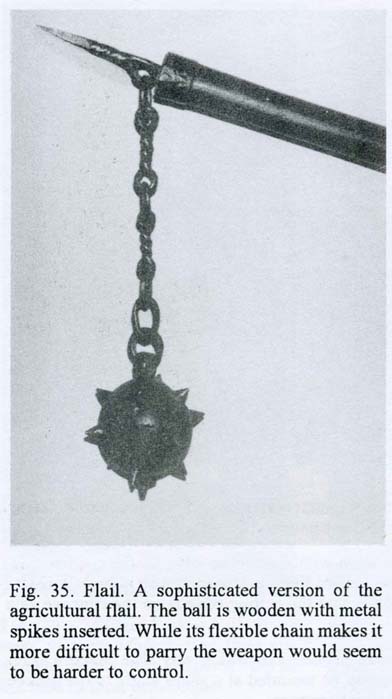
Flail: undated, length unknown.
 Attachment: 41.12 KB
Attachment: 41.12 KB
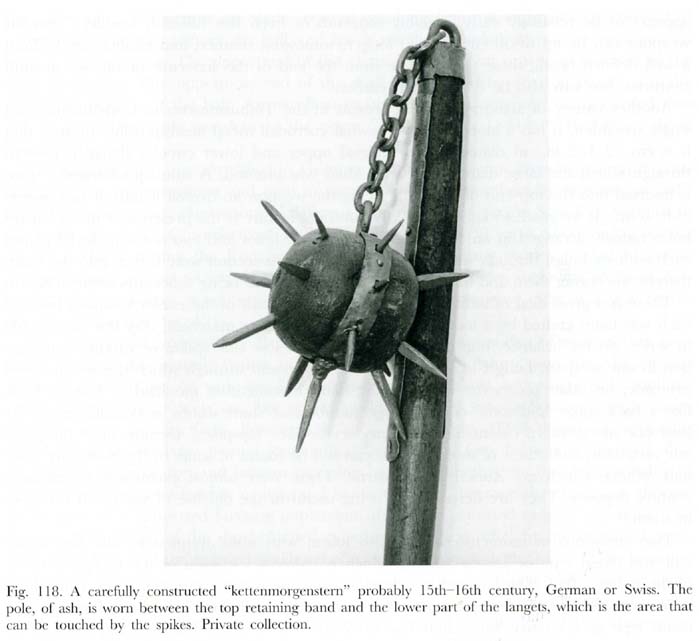
Flail, total length unknown. 15th/16th century.
 Attachment: 70.82 KB
Attachment: 70.82 KB
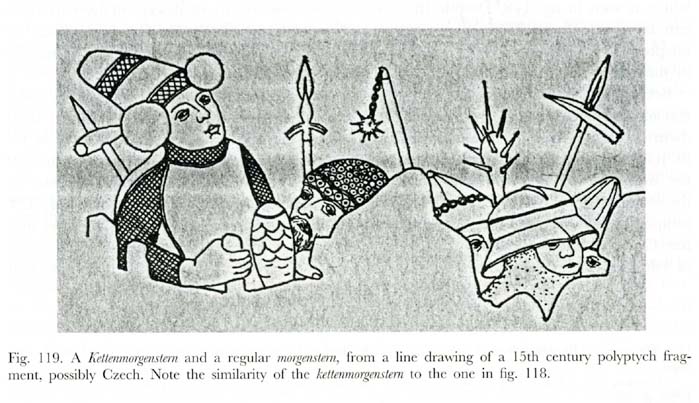
Period art showing flail. 15th century. Full length unknown.
 Attachment: 142.33 KB
Attachment: 142.33 KB
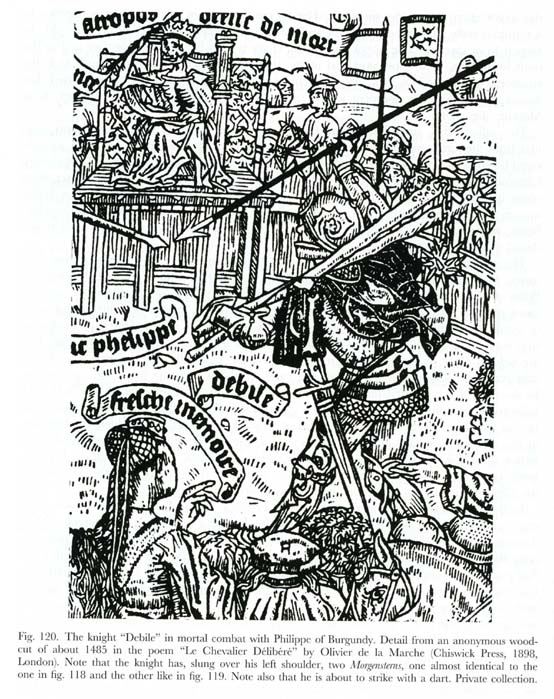
15th century period art showing knight with a flail and morgenstern on his shoulder. Maybe slightly long for "single-handed", but shorter than many big 2-handed ones.
 Attachment: 31.52 KB
Attachment: 31.52 KB
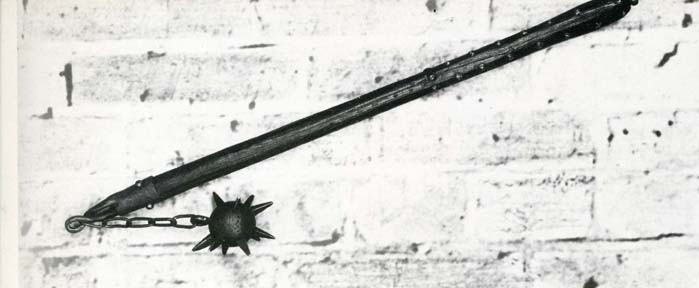
Definitely single-handed, but 16th century.
 Attachment: 90.01 KB
Attachment: 90.01 KB
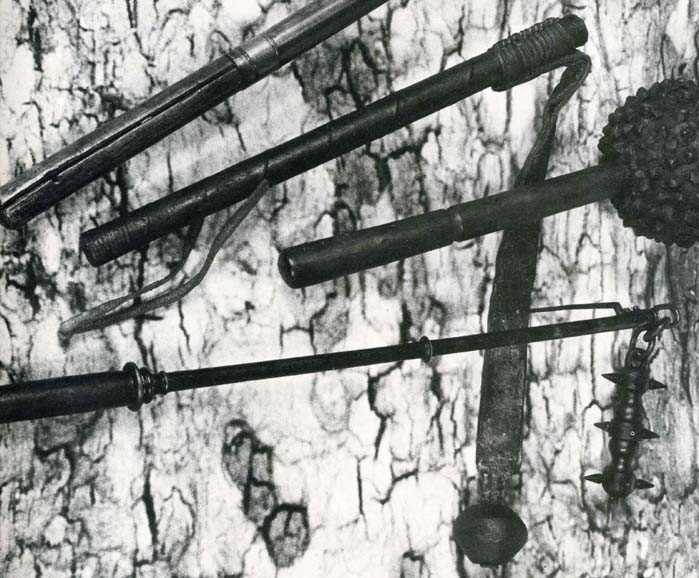
Definitely single-handed, but 18th/19th century and 16th/17th century.
Compounding the issue of finding single-handed examples is that a number of hafts are broken, so we can't tell the original length. In other cases, the photographers for the book/catalogue thought the entirety of the haft was boring, so the full length is not shown.
The notion that the flail is Victorian is just false. It may not be "Medieval", but it did exist as a military weapon.

Flail: undated, length unknown.

Flail, total length unknown. 15th/16th century.

Period art showing flail. 15th century. Full length unknown.

15th century period art showing knight with a flail and morgenstern on his shoulder. Maybe slightly long for "single-handed", but shorter than many big 2-handed ones.

Definitely single-handed, but 16th century.

Definitely single-handed, but 18th/19th century and 16th/17th century.
Here are some more.
 Attachment: 63.5 KB
Attachment: 63.5 KB
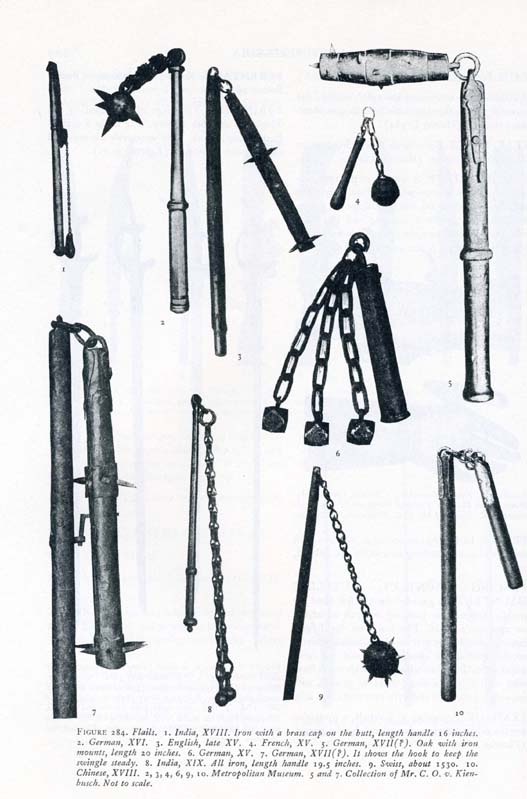

Here are a few more interesting images. The first is 12th or 13th c. The second is a painting by Piero della Francesca, dated around 1466 or thereabouts, "Battle Between Heraclius and Chosroes" (this of course is depicting a mythological event, but in the lower left quadrant of the painting, there is an unarmored man with a buckler wielding what appears to clearly be a three-headed flail with very small chains connecting the flail heads; I attached a closeup as well). Being unarmored, he would probably fail to qualify as "knightly", but it is a very nice image of a flail used single-handed.
http://forums.armourarchive.org/phpBB2/files/flail_209.jpg
http://oilpainting-frame.com/china/oil-painti...ncesca.htm
http://www.allpaintings.org/v/Renaissance/Pie...5.JPG.html
http://forums.armourarchive.org/phpBB2/files/flail_209.jpg
http://oilpainting-frame.com/china/oil-painti...ncesca.htm
http://www.allpaintings.org/v/Renaissance/Pie...5.JPG.html
Tests with weapons such as the nuchako and three section staff show that these weapons transfer LESS energy than a rigid weapon of the same length.
While they generate more kinetic enegy, their non-rigid nature means that they have a very innefficient energy transfer, as the striking part bounces back on impact.
As such, the only advantage of a flail is striking around the enemies defence. However, against an armoured opponent, a single blow would not be likely to incapacitate, and the slow recovery time of the flail would make it less suited for pummeling someone into submition that a solid shafted mace.
Against a lightly armoured opponent, more or less any weapon swung with some force would have effect, of course.
While they generate more kinetic enegy, their non-rigid nature means that they have a very innefficient energy transfer, as the striking part bounces back on impact.
As such, the only advantage of a flail is striking around the enemies defence. However, against an armoured opponent, a single blow would not be likely to incapacitate, and the slow recovery time of the flail would make it less suited for pummeling someone into submition that a solid shafted mace.
Against a lightly armoured opponent, more or less any weapon swung with some force would have effect, of course.
| Elling Polden wrote: |
| Tests with weapons such as the nuchako and three section staff show that these weapons transfer LESS energy than a rigid weapon of the same length.
While they generate more kinetic enegy, their non-rigid nature means that they have a very innefficient energy transfer, as the striking part bounces back on impact. As such, the only advantage of a flail is striking around the enemies defence. However, against an armoured opponent, a single blow would not be likely to incapacitate, and the slow recovery time of the flail would make it less suited for pummeling someone into submition that a solid shafted mace. Against a lightly armoured opponent, more or less any weapon swung with some force would have effect, of course. |
I'm hardly an expert, but I'm guessing mass plays a part in this, as the spiked head of a flail has a great deal more mass than the head of a nunchako or sectioned-staff. In my experience playing around with a flail replica, it creates a temendous amount of force and devestating damage, and this was only a single-handed variety.
The Hussites made good use of the longer, two-handed flail, and it allegedly was able to do some serious damage to armored foes, crushing limbs, denting or rending armor, etc.
At one point, I found myself wondering if flails weren't actually some kind of throwing weapon. It's a pity we haven't found much about them -- I've always wondered how well they're used.
M.
M.
Interesting. There is a mace flying through the air on the Bayoux tapestry, but I haven't heard anything like that about flails. And I sure haven't seen one flying in my life. ;)
The byzantines used throwing hammers. Throwing axes and knifes are notoriusly dificult to make hit head first. With a hammer, what part hits doesnt matter that much.
@J.W. Salyards;
I'm not saying a flai, or nuchako for that matter, can not be dangerous. I'm just pointing out that the same head on a rigid shaft would transfer even more energy.
@J.W. Salyards;
I'm not saying a flai, or nuchako for that matter, can not be dangerous. I'm just pointing out that the same head on a rigid shaft would transfer even more energy.
| Elling Polden wrote: |
|
@J.W. Salyards; I'm not saying a flai, or nuchako for that matter, can not be dangerous. I'm just pointing out that the same head on a rigid shaft would transfer even more energy. |
I'm not trying to be contentious, but I'd be very interest in seeing the research that proves this, as it seems counter-intuitive to me. Physics was never my strong suit, but I would imagine that leverage would increase the force of the blow with the flail, as the momentum would be increased.
I believe that the flail also operates differently than the nunchuka or sectioned staff, as the parts are not balanced at all. So I'm not sure they can be adequatley compared in this regard.
Regardless, another bonus to the flail is that the impact of the blow doesn't travel like a shockwave up your arm.
| J.W. Salyards wrote: | ||
I'm not trying to be contentious, but I'd be very interest in seeing the research that proves this, as it seems counter-intuitive to me. Physics was never my strong suit, but I would imagine that leverage would increase the force of the blow with the flail, as the momentum would be increased. I believe that the flail also operates differently than the nunchuka or sectioned staff, as the parts are not balanced at all. So I'm not sure they can be adequatley compared in this regard. Regardless, another bonus to the flail is that the impact of the blow doesn't travel like a shockwave up your arm. |
Well, I agree with the last about the shockwave and it does mean that one can really " flail away " ( pun intended ) without holding back as one might apprehending hand shock ?
As to the total amount of energy: The handle part of the flail as to be accelerated but probably contributes little or nothing to the transferred energy on impact, but even if this could be quantified with some complex math and physics I doubt it would make much of a difference in practice. ;) :D But, one can always be curious about the idea in a theoretical way. ;)
We just need somebody who has an extra ballistics gel dummy. :-)
Page 1 of 3
You cannot post new topics in this forumYou cannot reply to topics in this forum
You cannot edit your posts in this forum
You cannot delete your posts in this forum
You cannot vote in polls in this forum
You cannot attach files in this forum
You can download files in this forum
All contents © Copyright 2003-2006 myArmoury.com — All rights reserved
Discussion forums powered by phpBB © The phpBB Group
Switch to the Full-featured Version of the forum
Discussion forums powered by phpBB © The phpBB Group
Switch to the Full-featured Version of the forum